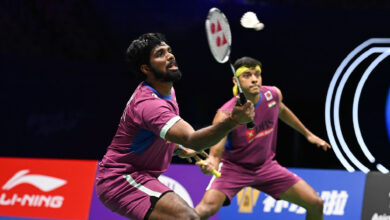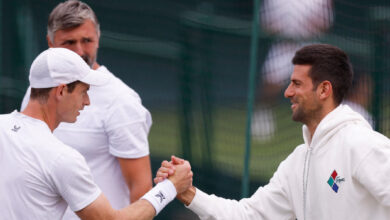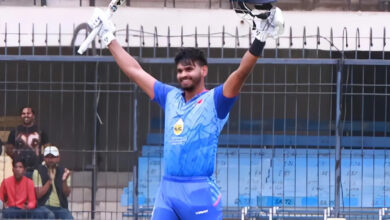Dos and don’ts for amateur marathoners

Last Sunday, a 36-year-old man died after collapsing while running the London Marathon. The cause of death isn’t established yet but the tragedy served as a precautionary tale for those attempting the 42.1 kilometre run. Post-COVID, athletes — professional runners and newbies– must len to their bodies paying attention to onset of sudden fatigue, uncharacteric breathing issues and dip in long-dance running ability, experts say.
Dr. Rajat Chauhan, a regular runner for 37 years, specialises in Sports-Exercise Medicine and Osteopathy/ Musculo-Skeletal Medicine. Dr Chauhan, who has worked at Manipal Hospital in Bengaluru, believes there are a host of underlying reasons which can increase chances of fatality during a marathon. He gives the example of misfortune striking a seemingly healthy Olympian, who didn’t have Covid, during a marathon.
“So there was this guy who had represented the US Olympic team. He passed away one fine day while running a marathon. What do you say, about someone like that?. We know there’s a condition called HOCM (Hypertrophic cardiomyopathy). A disorder that causes a sudden cardiac death in young people, including well-trained athletes. It is already tricky. COVID has complicated it more,” Dr Chauhan says.
Those who have recovered from COVID must err on the side of caution, he recommends.
Even experienced runners must tread carefully on return to endurance running after taking a break because of COVID. “When in doubt, don’t push it,” he says. “Long COVID (post COVID symptoms) is dangerous. Even after a month of things settling down, it can bite you. So if you could run 12 kilometres an hour before COVID but can’t now that is an indication to go slow. Don’t start with a 100 percent effort. Most people don’t know that immunity is low during a flu or regular cold. And in this case (COVID), the immunity is even worse.”
Doing screening health checks can reduce chances of an untoward incident while running but can’t guarantee an incident-free marathon.
A study published in the British Journal of Sports Medicine in June 2020 titled ‘Graduated return to play guidance following COVID-19 infection’ ls out blood testing for markers of inflammation, cardiac monitoring, respiratory function assessment and renal and haematological monitoring for those who experienced long-term symptoms.
“Tests sometimes pick up (a problem) or may not pick up something. It’s not a foolproof thing. We are playing the statics game, we are trying to reduce the chances as much as we can,” Dr Chauhan says.
For those starting from scratch, it is advisable to start with a 5 kilometre run, progress to the 10k and then target the half marathon – 21 kilometres. Dr. Chauhan suggests a minimum of four months preparation for the half marathon, while a full marathon needs six months. The same timeline applies for those who have completed half marathons and full marathons before but have not been running long dances for a year.
Training should comprise strength training in addition to running,” Dr Chauhan adds.
Deciding to run a marathon on a lark can be one of the biggest makes, the experienced doctor says while giving an example.
Chauhan recalls an incident when he was race and medical director for the first Bangalore 10K in 2008.
“This guy had regered the day before and at four or five kilometres, he collapsed. He didn’t have a pulse. Got him to a hospital and luckily we got his pulse back. He was wearing leather shoes, he was wearing trousers and a shirt.He had just signed up because there was a bet with his friend or something. Reger a month or two before, so you end up preparing.”
Hirak Parikh completed the London Marathon and had passed right the 36-year-old who had collapsed, when he was getting medical help. Parikh logs between 45-60 miles every week for 14 to 16 weeks, before increasing the weekly dance. But he preaches caution to beginners.
“For those starting out, the best idea would be to first run a few shorter races and build to a half marathon before attempting a full marathon. It’s possible to run a good race with about 40-50 miles a week (during training) with a long run being a big component. The build-up if not starting from a good running base should be around 4-6 months at least with gradually increasing dance and then finally speed on the run,” Parikh says.
A foolish make would be Googling your way to run a marathon. “Most common make is to download an internet plan and subject the body to something it’s not used to suddenly,” Parikh says.
Parikh was Covid positive and recovered before he ran the Boston Marathon.
“I had COVID right before Boston 2022, and I’m not sure if it affected me too adversely. Like any injury or disease, the best course of action is to feel things out before jumping back in at full intensity.”
Runners need to keep in mind every aspect about a race, like weather at different venues and hydration. Drinking too much water is also counterproductive.
Himanshu Sareen, 38, has participated in marathons in Berlin, London, Boston, Tokyo and Antarctica. He talks about the importance of acclimatisation and how different weather during training and during a marathon can make a difference.
“I am based out of Bombay, barring three to four months here, the weather is mostly humid. My training happens in that weather. In the actual race, say in London or Berlin, the weather will be different and that can affect my timings because I have trained in different weather conditions. People sometimes don’t give themselves time for acclimatisation. If a race is on a Sunday, people due to their constraints, travel on a Thursday for a race happening in Europe. So even though the weather conditions are marginally favourable, you are actually pushing your body,” Sareen says.
He also discourages runners from succumbing to peer pressure in this day and age of all pervasive social media.
“I may be wrong, but I feel that a lot of people are getting into marathon running because they see their friends doing it. Even if you are walking the whole 42 kilometres, it is not easy. You have to give your body time to be fit enough to run a marathon.”
Over-hydration is not advisable
Dr Chauhan advises amateur runners not to go overboard when it comes to gulping down water.
Professional runners have people who carry drinks and hand it over at water stations. Kenya’s world record holder Eliud Kipchoge’s bottle man Claus Henning-Schulke became a mini social media sensation after videos of him handing over drinks surfaced. But amateur runners must not make the make of drinking too much water.
“Hydration and food need to be kept in check. But overhydration is harmful. Because there are water stations, how our mind works is that we’ve paid regration fees so let’s take back as much money as we can and we drink as much water. Too much plain water can kill you basically.







